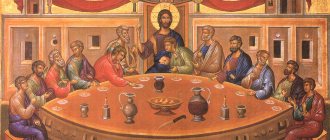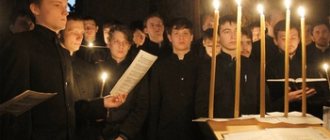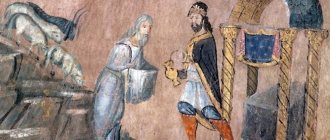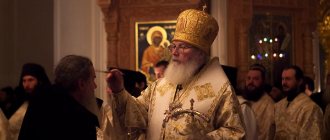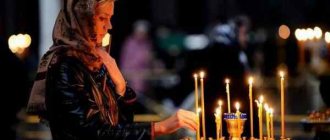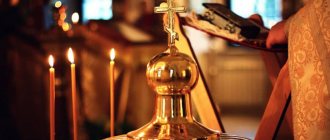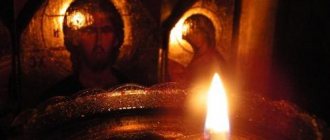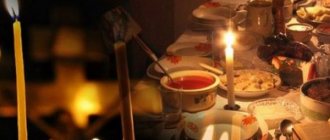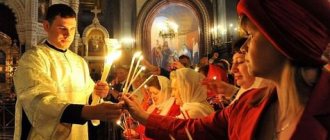To the begining
Sedmitsa:
Church Slavonic name for the week, a seven-day calendar cycle, with the countdown starting on Sunday.
Week:
in Church Slavonic, which is the liturgical language of the Russian Orthodox Church, the name of Sunday: the first (not the last!) day of the week.
Read a detailed description of the apostolic and gospel readings at the Divine Liturgy on the week of the Triumph of Orthodoxy with interpretations of the Holy Fathers and Doctors of the Church:
First week of Lent: Triumph of Orthodoxy
The triumph of Orthodoxy is the triumph of common sense
In this name, the Church preserves the memory of the victory over the heresy of iconoclasm, the essence of which was the denial of the veneration of icons. In 730, the Byzantine emperor Leo III the Isaurian banned the veneration of icons. The result of this decision was the destruction of thousands of icons, as well as mosaics, frescoes, statues of saints and painted altars in many churches. Iconoclasm was officially recognized in 754 at the so-called Iconoclastic Council with the support of Emperor Constantine V Copronymus, who severely attacked Orthodox icon worshipers, especially monks. In their cruelty, the iconoclastic persecution was comparable to the persecution of the Church by the pagan emperors Diocletian and Nero. According to the chronicler Theophan, a contemporary of these sad events, the emperor:
“...he killed many monks with blows of whips, and even with a sword, and blinded countless numbers; some had their beards smeared with wax and oil, then the fire was turned on and thus burned their faces and heads; He sent others into exile after many torments.”
The fight against icon veneration lasted for almost a century, and only stopped in 843, when, on the initiative of Empress Theodora, a council was convened in Constantinople, at which it was decided to restore the veneration of icons in the Church. After the council condemned the iconoclast heretics, Theodora organized a church celebration, which fell on the first Sunday of Lent. On that day, the patriarch, metropolitans, abbots of monasteries, priests and a huge number of lay people openly took to the streets of the capital with icons in their hands for the first time in many decades. Empress Theodora herself joined them. In memory of this event, every year on the first Sunday of Great Lent, the Orthodox Church solemnly celebrates the restoration of icon veneration, called the Triumph of Orthodoxy.
Everyone knows that Lent begins on Monday. Why?
After all, according to the biblical and church counting of days, this is already the second (!) day of the week as a seven-day calendar cycle. Yes, simply because the period of repentance and crying about one’s sins cannot begin with the festive “Little Easter,” as every Sunday is called, celebrated with a solemn Liturgy and accompanying joyful singing! This leads to understandable confusion for those who want to understand the structural features of our Lenten cycle. Indeed, the past Cheese Fat Week (or Forgiveness Sunday, March 13, 2016) is already the fourth (!) “week” of the preparatory period for fasting. But this period itself consists of three weeks in the usual sense (more precisely, three weeks, the 21st day, plus one more, the 22nd day, Forgiveness Sunday!).
To resolve this apparent contradiction, let us remember that in church calendar usage the word week means only one day - Sunday (the Slavic word week comes from the phrase not delati - that is, “not to work”
, but dedicate this sacred day to God).
Therefore, Lent begins not on a holiday Sunday, but on a weekday Monday (its very name means week by week, that is, after a week!). Accordingly, the first Lenten week (= Sunday) begins only on the seventh day: this first Sunday within the Lenten period is dedicated to the Triumph of Orthodoxy. It is quite clear that Lent also ends on a “weekday”
day (in quotes, because we are talking about the formal place of this day within the seven-day weekly cycle, and not about its Christian content!).
This is the “theology of time”
: the Lenten penitential period begins on Monday, and the festive Easter cycle begins with the main Resurrection (Easter) of the year! And this Day itself is the first Easter week. Next Sunday is already the second Easter week, etc.
Great Compline with the Canon of St. Andrew of Crete
On the weekdays of Great Lent and on the days of Lesser Lent, when the service with Hallelujah is celebrated, as well as on those days of the year when Vespers is served in the afternoon (for example, Christmas and Epiphany Eve), the Charter prescribes the celebration of Great Compline. In the first four days of Great Lent, Great Compline is celebrated with the reading of the canon of St. Andrew of Crete, and it is divided into four parts.
The rite of Great Compline consists mainly of psalms and is divided into three parts. The first part includes six psalms and the vibrant song God is with us from the book of the prophet Isaiah. The second part also includes psalms and a prayer from King Manasseh taken from 2 Chronicles of the Old Testament. The third part includes psalms and doxology, after which the Theotokos canon and a special chant “Lord of hosts, be with us…” with verses of the 150th psalm are sung. The charter specifies to sing them “slowly and inertly”
, i.e. very loud and slow.
In the first four days of Great Lent, the canon of St. Andrew of Crete is appointed at Great Compline, but not in the final part, but in the very first. The service begins like this: “Blessed be God...”, the usual beginning and the 69th Psalm, which is in the third part of Great Compline, but during these four days it is moved to the beginning, and then it is no longer repeated in its usual place. After the 69th Psalm, the reading of the canon of St. Petersburg immediately follows. Andrey Kritsky.
The Great Canon is a miracle of all church hymnography; these are texts of amazing power and beauty. It begins with a text addressed to Christ:
“Where will I begin to cry about my accursed life and deeds? Shall I make a beginning, O Christ, for this present mourning?”
where should I start to repent, because it is so difficult. Then follows the famous troparion:
“Go, damned soul, with your flesh. Confess to the Creator of all..."
Amazing words, here is both Christian anthropology and asceticism: the flesh must also participate in repentance, as an integral part of human nature.
In its content, the Great Canon represents a conversation between a penitent and his own soul, and from the very first words an appeal to his soul follows:
“Come, accursed soul, with your flesh, confess to the Creator of all, and remain the rest of your former speechlessness, and bring tears to God in repentance.”
This conversation with the soul, its constant persuasion, calls to repent, reach its apogee in the kontakion, which is sung after the 6th song:
“My soul, my soul, arise, what are you writing off? The end is approaching, and if you are embarrassed, rise up, so that Christ God, who is everywhere and fulfills everything, will have mercy on you.”
Among the main features of the Great Canon we must include the very wide use of images and plots from Holy Scripture, both the Old and New Testaments. In these examples, the soul is constantly exhorted - remember this righteous man, he pleased God so much, remember this righteous man, he pleased him so much - you did nothing of the kind.
In the very first troparia Adam and Eve are remembered, and a great many biblical characters are remembered: Moses, Aaron, Abraham, Joseph. Some are spoken of in a positive sense, others in a negative sense, some need to be imitated, some not.
“The charioteer Elijah, with the chariot of virtues, entered as if into Heaven, sometimes carried higher than earthly things. For this reason, my soul, think of the sunrise.”
think, my soul, about the ascension of the Old Testament righteous.
“Thou hast imitated Gehazi, accursed one, always with a bad mind, the soul, whose love of money put aside until old age, flee the fire of Gehenna, having retreated from thy evil ones.”
at least in old age, reject Gehazi’s love of money, soul, and abandon your atrocities, avoid the fire of Gehenna. As you can see, the texts are quite difficult, so it is necessary to prepare in advance for the perception of the Great Canon.
In the final song of the first day, after all the memories, troparia of amazing power follow:
“The law is weak, the gospel celebrates, but the scriptures are all careless in you, the prophets are weak, and all the righteous word: your scabs, about your soul, having multiplied, I am not a physician who heals you.”
there is nothing to remember from the Old Testament, everything is useless. I will give you examples from the New Testament, maybe then you will repent:
“I bring new instructions from the Scriptures, leading you, the soul, to tenderness: be jealous of the righteous, turn away from sinners, and propitiate Christ with prayers and pampering and purity and persecution.”
The worst sinners have repented and will come to the Kingdom of Heaven before you:
“Christ became man, calling the thieves and harlots to repentance: soul, repent, the door of the Kingdom has already been opened, and the Pharisees and the publican and the adulterer who repents are anticipating it.”
The Great Canon, moving us to repentance by all means, in the last troparia seems to reveal to us its “methodology”: as I talked with you, my soul, I reminded you of the righteous men of the Old Testament, and gave you New Testament images as an example, and all in vain:
“You were not jealous of them, either in soul, neither in deeds, nor in life: but woe to you, if you are ever judged.”
Woe to you when you appear in court!
At the end of Great Compline there is a rite of forgiveness, similar to that which was performed on the week of evening. Indicated after the last prayers of Great Compline:
“The primate bows to the ground, saying to the brethren: Bless the holy fathers, forgive me the sinner who has sinned in word, deed and with all my feelings.” Brethren: “God will forgive you, Holy Father.”
Thus, the service of the first week introduces us to Great Lent, educates, inspires, exhorts, directing us to the Lenten feat.
LiveInternetLiveInternet
Without Me you cannot do anything.
In. 15.5
On Wednesdays and Fridays (and some holidays) throughout Lent, the Liturgy of the Presanctified Gifts is celebrated.
Photo: Patriarchia.Ru
In the 1st week of Lent, according to tradition, most Orthodox Christians begin the Holy Mysteries of Christ after special concentrated preparation for confession and communion, usually on Saturday or Sunday. During the Liturgy of the Presanctified Gifts in the 1st week, those who cannot, due to illness or for any other good reason, strictly fast for five days of this special Lenten week receive communion. During the remaining Lenten weeks, everyone can partake at the Liturgy of the Presanctified Gifts, except for infants, who receive communion only during the full liturgy.
Hymns of the 1st Week of Great Lent
Beginningless, uncreated Trinity, indivisible Unity, accept me repentantly, save me when I have sinned, I am your creation, do not despise me: but have mercy and deliver me from my fiery condemnation.
I have been cast down, O Savior, before Thy gates; in my old age, do not cast me aside into hell, but before the end, as a Lover of mankind, grant me remission of my sins.
“Prostrated before Your gates, Savior, even in my old age do not cast me, empty, into hell, but before my death, as a Lover of Mankind, forgive my sins.”
Troparions from the Great Canon of St. Andrew of Crete from the Wednesday service of the first week
Weigh our creation, weigh our weakness, O Lover of mankind: we have sinned, but have not departed from You, O God, with our hands lifted up to an alien god, spare us with Your goodness, O Compassionate One.
“You know our condition, you know our weakness, O Lover of Humanity; We sinned, but we did not depart from You, O God, and did not lift up our hands to another god - spare us in Your kindness, O Good One.”
Troparion of prophecy from the Wednesday service of the first week
Instructions for those entering the post
If the soul of a Christian yearns for purity and seeks mental health, then it should try to make the best possible use of this time that is beneficial for the soul. That is why among true God-lovers it is customary to mutually congratulate each other on the onset of Lent.
Physical fasting means nothing without the spiritual fasting of the inner man, which consists of protecting oneself from passions. This fast of the inner man is pleasing to God and will compensate for your lack of bodily fasting.
Venerable Barsanuphius the Great
Let us use our strength to work well in this short time, keeping our work pure from all evil, so that we can be saved from the hands of the princes of darkness who will meet us; for they are evil and unmerciful.
Venerable Abba Isaiah the Hermit
Let us not behave in such a way that today we have self-control and meekness, and in the morning intemperance and pride; today - silence, vigil, humility, and in the morning - entertainment, insatiable sleep, disobedience and the like.
Venerable Ephraim the Syrian
We must be sure that no matter how much we strengthen ourselves, we will never be able to accomplish anything if we do not use assistance from above.
Saint John Chrysostom
And truly, if someone does not give himself up to the slaughter, like a sheep, for every even smallest virtue and does not shed his blood for it, he will never acquire it. Thus, in His economy, God ordained that we should purchase eternal life through arbitrary death. – Don’t you want to die an arbitrary death and live eternal life? - And now you are dead.
Venerable Simeon the New Theologian
The sorrow associated with cutting off sinful habits will subsequently bring joy, and prosperity will prompt us to thank God for His ineffable mercies towards us.
Metropolitan John (Snychev)
To hold back anger and resentment is our own business and requires a great feat and considerable labor; but in order not to be embarrassed at all and to acquire equanimity of heart and perfect meekness - this is the work of the one God in us.
Venerable Simeon the New Theologian
A Christian cannot by himself make the desired change in himself, and Christ will not thank him with the gift of this change if he does not surrender himself to Him with all his heart.
Venerable Simeon the New Theologian
About the prayer of Ephraim the Syrian
Great Lent. Sretensky Monastery. Photo: V. Kornyushin / Pravoslavie.Ru
“Lord and Master of my life! Do not give me the spirit of idleness, despondency, covetousness and idle talk; Grant the spirit of chastity, humility, patience and love to Thy servant."
This is the prayer that you, brothers, have heard many times in the temple these days. It was written by St. Ephraim the Syrian, shepherd and teacher of the flock of Christ, who lived in the 4th century after the Nativity of Christ, gave it to the Church; and the Church commanded to recite it on the days of the Holy and Great Pentecost at every service, except Saturday and Sunday.
Why did the Holy Church introduce this and not another prayer into the divine service during Great Lent? In order to constantly remind us of what exactly we need to ask and pray to the Lord in the field of fasting and repentance. Just as a mother protects her children from colds, so the Holy Church now warns us against temptations, instructing us from which direction they come to us and by what means we can repel them from ourselves. Feeling the tenderness of the Church’s maternal care for our salvation, let us intensify our attention, let us enter into her good intentions for us and follow her guidance, as children follow the instructions of their mother.
When the Holy Church forces us, during fasting and repentance, to pray to the Lord to remove from us the spirit of idleness, despondency, covetousness and idle talk, this indicates that this spirit, more than at other times, overwhelms others during the days of fasting. In fact, what time is more free for exercise in the word of God, if not the time devoted to preparing for confession and communion? And at this time the spirit of idleness tempts us the most! What time is more convenient for spiritual reflection than the time devoted to going to church to listen to soul-saving prayers, reading and singing there? And at this time the most unclean thoughts enter our hearts! What time is more conducive to peace in the soul than the time of fasting? And at this time we indulge in the most boredom and despondency! What time is more conducive to practicing silence than the time of repentance? And at this time we engage in the most idle talk!
Is not it? Only he does not notice these temptations who fasts and goes to church out of need; but he who fasts as he should and prays in church as he should understands the full importance of the prayer used today by the Church.
What is the spirit of idleness? This is idleness of mind in the matter of our correction. The mind must exercise itself in the word of God, delve into the reading of prayers, encourage us to the feats of fasting and prayer, consider our behavior in accordance with the commandments of Christ, admit our limitations in our shortcomings and errors, and fulfill the requirements of faith. But when he does not do all this, is he not an idle mind, distracted and immersed in sensuality? It’s a pity for the person who fasts, having a spirit of idleness in him: he will exhaust himself, but will not receive any benefit.
What is the spirit of despondency? This is the sorrow of an idle spirit. He yearns for the pleasures he enjoyed before Lent, grieves that he cannot violate the rules of the Church without remorse, and sighs when looking at Lenten food. And doesn’t this spirit of despondency and melancholy burden a person more than the strictest fast? Isn't it more dangerous to health than simple, unsophisticated food? I pity the person who yearns for pleasures during Lent. Pleasures were invented by the human mind, and fasting was instituted by God Himself.
What is the spirit of covetousness? This is the pride of life. Whoever fasts while having it fasts outwardly. Is external fasting pleasing to God? The Pharisee fasted, but received no benefit; on the contrary, the publican did not fast, but was preferred to the fasting Pharisee. Obviously, because one was filled with worldly pride, the other had a humble heart and a contrite spirit.
What is the spirit of idle talk? This is a passion for idle talk, which comes partly from poverty of mind, partly from idleness, partly from envy and anger. But no matter what this passion comes from, it is the most dangerous passion. For every idle word that penetrates the soul of a neighbor, if it is not immediately suppressed in it, becomes a seed of evil, growing into shoots and fruits. Don't think that words thrown into the air will disappear into thin air. No! “For every idle word that people speak, they will give an answer on the day of judgment” (Matthew 12:36), says the Savior himself.
Nikanor, Metropolitan of Novgorod and St. Petersburg
March 5, 2014
- Rating: 6.9|Votes: 9EVENING SERVICE AT SRETENSKY MONASTERY ON WEDNESDAY OF THE FIRST WEEK OF GREAT LENT12 / February 25, 2015 Wednesday of the First Week of Great Lent. Sretensky Monastery. Great Compline with reading of the great penitential canon of St. Andrey Kritsky. Choir of the Sretensky Monastery. (MP3 file. Duration 1:34:13 min. Size 67.9 Mb)
- Rating: 10|Votes: 5MORNING SERVICE AT SRETENSKY MONASTERY ON WEDNESDAY OF THE FIRST WEEK OF GREAT LENT12 / February 25, 2015 Wednesday of the 1st week of Great Lent. Sretensky Monastery. Midnight Office, Matins, 1st, 3rd, 6th, 9th hours, pictorial, Vespers with the Litugy of the Presanctified Gifts. Choir of Sretensky Theological Seminary. (MP3 file. Duration 5:24:45 min. Size 233.9 Mb)
- Rating: 10|Votes: 1MORNING SERVICE AT SRETENSKY MONASTERY ON WEDNESDAY OF THE FIRST WEEK OF GREAT LENT February 20 / March 5, 2014 Wednesday of the 1st week of Great Lent. Sretensky Monastery. Midnight Office, Matins, 1st, 3rd, 6th, 9th hours, pictorial, Vespers with the Litugy of the Presanctified Gifts. Choir of Sretensky Theological Seminary. (MP3 file. Duration 5:35:54 min. Size 241.9 Mb)
- Rating: 10|Votes: 2EVENING SERVICE AT SRETENSKY MONASTERY ON WEDNESDAY OF THE FIRST WEEK OF GREAT LENT7 / March 20, 2013 Wednesday of the First Week of Great Lent. Sretensky Monastery. Great Compline with reading of the great penitential canon of St. Andrey Kritsky. Choir of the Sretensky Monastery. (MP3 file. Duration 1:44:25 min. Size 75.2 Mb)
- MORNING SERVICE AT SRETENSKY MONASTERY ON WEDNESDAY OF THE FIRST WEEK OF GREAT LENT 7 / March 20, 2013 Wednesday of the 1st week of Great Lent. Sretensky Monastery. Midnight Office, Matins, 1st, 3rd, 6th, 9th hours, pictorial, Vespers with the Litugy of the Presanctified Gifts. Choir of Sretensky Theological Seminary. (MP3 file. Duration 5:33:58 min. Size 240.5 Mb)
- Rating: 2|Votes: 1MORNING SERVICE ON WEDNESDAY OF THE FIRST WEEK OF GREAT LENT IN SRETENSKY MONASTERY February 24 / March 9. Wednesday of the First Week of Great Lent. Sretensky Monastery. Midnight Office, Matins, 1st, 3rd, 6th, 9th hours, pictorial, Vespers with the Litugy of the Presanctified Gifts. Choir of Sretensky Theological Seminary. (MP3 file. Duration 332:43 min. Size 159.8 Mb)
Rating: 7.4|Votes: 251ABOUT THE GREAT CANON OF ST. ANDREW OF CRETEDeacon Vladimir VasilikThe Great Canon of St. Andrew of Crete represents a broad historical panorama, outlining the history of human sin and human righteousness, the rejection of God and His acceptance. The content of the canon is deeply Christocentric: in each song there are heartfelt appeals to Christ, and the only way of purification for St. Andrew is in Christ, through sobriety and asceticism, through action - to the vision of the Divine.
Rating: 8.3|Votes: 1066THE FIRST WEEK OF GREAT LENT: PASTORAL ADVICE The first week of Great Lent is approaching - a time of special prayer and strict abstinence. The Pravoslavie.ru portal asked the pastors to say a few words about the main thing that, in their opinion, should fill the life of a Christian during the days of Lent, to suggest something from personal experience, to help troubled Christians determine a spiritual program - maximum and minimum - during these days.- MORNING SERVICE ON WEDNESDAY OF THE FIRST WEEK OF GREAT LENT AT SRETENSKY MONASTERY 4 / February 17. Wednesday of the 1st week of Lent. Sretensky Monastery. Midnight Office, Matins, 1st, 3rd, 6th, 9th hours, pictorial, Vespers with the Liturgy of the Presanctified Gifts. Choir of Sretensky Theological Seminary. (MP3 file. Duration 333:12 min. Size 160 Mb)
- Rating: 4.1|Votes: 77 hymns of the Great Compline February 22 / March 7, 2006 - Tuesday of the First Week of Great Lent. Sretensky Monastery. Great Compline. The choir of the Sretensky Monastery and the choir of the Sretensky Theological Seminary.
- Rating: 5|Votes: 6 READING OF THE GREAT CANON OF REPENTANCE. ANDREY KRITSKY. WEDNESDAY OF THE FIRST WEEK OF GREAT LENT February 23 / March 8, 2006 - Wednesday of the First Week of Great Lent. Sretensky Monastery. Great Penitential Canon of St. Andrey Kritsky. The choir of the Sretensky Monastery and the choir of the Sretensky Theological Seminary.
- https://www.pravoslavie.ru/1606.html
Reading the canon of Andrei Kritsky
Is it obligatory for Orthodox Christians to be present during the reading of this canon? Are there any canonical rules?
The canonical tradition of the Orthodox Church speaks of the need to be present at the Liturgy. There are no such instructions regarding the canon of Andrew of Crete. But it should be understood that it is not the principle of obligation that is important (as they say, “a slave is not a pilgrim”
, no one will force anyone), but the desire and decision to be in the Church during the service.
Of course, there are a number of factors that can influence: work, business trips, illness, the health of others, urgent matters, etc. It is precisely the desire
to be involved in the liturgical life of the Church
that is tested in such a situation
, when, on the one hand, there is everything these are urgent and weighty reasons, on the other hand, the desire to attend all services at least for the first week.
The following comparison can be made: a person sets aside time to play sports or attend courses, but when it comes to worship, there are a thousand arguments why not to go to church:
your legs hurt, your back hurts, you’re lame, you’re blind, you have a long way to go, you don’t understand anything, etc. These are excuses.
People, tired of work, find time to go to, say, foreign language courses at the end of the working day. Where, too, not everything is clear, but nevertheless they are ready to spend time and effort to understand the language, but for some reason in a situation where it is not clear what they read in the temple, they do not waste time and effort to understand, but accept radical Solution: I won’t go at all. This behavior is illogical. If a person is interested in understanding what is read at a service, he will find an opportunity to understand and understand. In general, as they say, “those who want, look for opportunities, and those who don’t want, look for reasons
.
There really are a lot of worries in life, people have grown into the bustle of worldly affairs, and Lent is precisely the period when at least a small part of one’s time needs to be allocated and devoted to God. Grigory Dvoeslov has an interesting idea on this matter, who considers Lent as a tithe of the year
which must be given to God.
Indeed, if you do not take into account Sundays, when fasting is relaxed, and Holy Week (which in the charter is considered separately from the Holy Pentecost), then you get 36 days
, i.e. practically a tithe of the year.
The Great Canon is another of the few possibilities for kneeling prayer. There are not many services where the entire temple bows to the ground. Tell us about this feature.
Kneeling
in the Orthodox Church it is associated with deep contrition of the heart, with
repentance
.
For example, bowing to the ground on days of joy is incorrect and is not prescribed by the Charter. For example, on Easter days bows are canceled
.
But during Great Lent, during the period of intense feat, reminders of repentance, you need to act in accordance with your condition. Of course, kneeling introduces us to an atmosphere of repentance. Therefore, whenever possible, you need to bow to the ground: during prayer, St. Ephraim the Syrian, after each troparion of the Great Canon of St. Andrey Kritsky. At one time this was a widespread practice, but then, due to various circumstances, it was not present in all churches. Nevertheless, now, in the first week of Great Lent, parishioners of the Kiev-Pechersk Lavra and many parish churches, young and old, bow to the ground for each troparion of the Great Canon of St. Andrey. from a conversation with Archimandrite Sylvester (Stoichev) about Lenten services (based on materials from praflife.org)
In almost all churches, the Great Canon is usually read at 18:00, so that people have time to go to church after work. But there are situations when there is no way to be in church all evenings. Then it will be very useful and good to read the canon at home. Below you can download the texts of the canon both for each day of the first week and the full text of the canon.
Canon of Andrew of Crete on Monday of the first week of Great Lent
Canon of Andrew of Crete on Tuesday of the first week of Great Lent
Canon of Andrew of Crete on Wednesday of the first week of Great Lent
Canon of Andrew of Crete on Thursday of the first week of Great Lent
Full text of the canon of Andrew of Crete in Church Slavonic ( c/w. font
)
Full text of the canon of Andrew of Crete in Church Slavonic ( civil script with parallel translation
)
First week of Lent
The Holy Pentecost marks the beginning of a long abstinence from food, which begins the first week of Lent.
Usually, with the beginning of Lent, it is customary to abstain not only from the variety of foods consumed, but from entertainment, so Christians stopped singing songs and focused on inner purity.
It was believed that voluntary fasting would serve as a good basis for speedy enlightenment and drawing closer to the Lord by bringing purity not only of the body, but also of the soul.
During the first few days of the first week of Lent, the most stringent restrictions on food consumption are observed. Previously, fasting was characterized by exceptional severity: even drinking water was not allowed. Now the rules have been relaxed: you can drink and eat cereals and vegetables.
From the beginning of fasting, on the days from Monday to Friday of the week, it is advisable to take cold, low-fat food and drink chilled water in the evenings, once a day. From Saturday it is allowed to eat Lenten dishes sprinkled with vegetable oils and drink grape wine twice a day.
